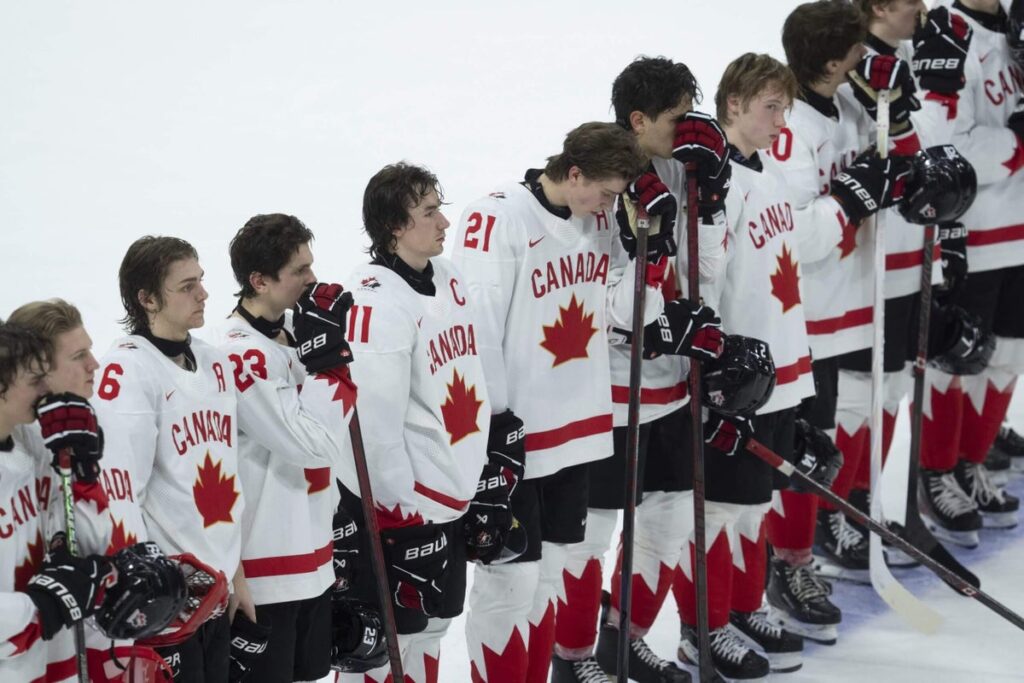[ad_1]
OTTAWA — Team Canada lost in the quarterfinals to Czechia at the World Juniors for a second straight year. It’s natural given their difficult effort on home ice — highlighted by only scoring 10 goals in the round-robin and a historic loss to Latvia — to want explanations and look for scapegoats. Did the management team make bad decisions in the selection process? Did the team deploy the talent it had properly? Did the players underperform and choke in the big moments?
Those are all good questions, and as I tend to do for almost every World Junior tournament, I had predicted this team would win gold and thought it had a roster that could roll over opponents like we’re accustomed to. But that was wrong, and that’s on me for misevaluating the team.
In hindsight, there were obvious signs this could happen. When Canada’s selection camp ended, we had inklings they focused too much on compete and not enough on skill. They opted to bring a lot of small, energy wingers with good but not great skill like Tanner Howe, Luca Pinelli, Ethan Gauthier and Mathieu Cataford over a dynamic selection camp standout and 2024 No. 3 pick in Beckett Sennecke, even if he was 18 and his two-way game wasn’t as polished. He was impressive enough at camp that one NHL scout in attendance thought Sennecke would be one of Canada’s best forwards. The result was a forward group that made shockingly few creative plays and never seemed to consistently generate dangerous chances. After the end of the quarterfinals, not one Canadian player ranked in the top 30 in tournament scoring.
This team had some high-end skill, but their most dynamic displays of talent often came from draft-eligibles like Porter Martone and Matthew Schaefer, a draft-minus-one in Gavin McKenna or the 18-year-old Berkly Catton. After those players, there weren’t many others whose skill was truly special. Those four players are excellent NHL prospects who perhaps should have had better tournaments, but it’s difficult for even great 17- and 18-year-olds to stand out on Team Canada or in the World Juniors in general. The injury to Schaefer did sting a lot, though. Pre-tournament play can often be a mirage, as Canada beat Sweden and Czechia, but Schaefer was excellent in the warmup games and the first four periods of the regular tournament, looking like a legit potential No. 1 pick. Canada never seemed the same after he went down with a broken clavicle in the first period versus Latvia.
Outside the unique cases where you have someone like Connor Bedard on your team, 19-year-old players need to be the leaders, as they were for Czechia, USA and Sweden in this tournament, and Canada’s were very vanilla. As one NHL scout said following the loss to Latvia, “Their most talented 19-year-olds are Calum Ritchie and Easton Cowan, who are probably third-line players in the NHL.” That’s not the end of the world on its own if they had a lot of older guys who rose to that level like Sweden or Czechia, but they didn’t. Some may shout that they should have played Carson Rehkopf, who is 19 and a rich junior scorer, more. That’s reasonable, but his effort and discipline didn’t do him any favors with the coaching staff.
Canada’s blue line was a significant issue. Coming into the tournament we knew they were opting for steady, mobile two-way guys over one-way skill, and they would be a bit plain with their puck-moving, but it was plainer than I anticipated. There were no plays being made by their defensemen, and collectively their defensemen scored 10 points across five games.
There were two potential explanations for this. One was the loss of Schaefer to injury. He was expected to run a power-play unit and prior to the injury, most of the blue-line offense was coming from him. The second was to bring top-10 2024 picks Zayne Parekh or Carter Yakemchuk. On the one hand, they’re both dynamic players who could have helped the power play and brought a lot of offense. On the other hand, neither was as amazing in the first half of the season as hoped and Yakemchuk didn’t have a great summer camp while Parekh struggled at selection camp. Some may argue they should have been on the team regardless, and some may play devil’s advocate and point out that “They couldn’t make THIS team?!”
Despite all their issues, this was still a Canadian team full of junior players who have been top players in their respective leagues. Even if this actually wasn’t a great Team Canada, they should have done better, and not scored just as many round-robin goals as Switzerland. You can blame deployment, luck, officiating and discipline. Sometimes players simply underperform. Regardless of what the true talent bar and expected outcome for this team was, it’s hard to look past the mediocre skill level that was often on display, especially against teams like Latvia and Germany, never mind in the tough games versus Czechia and USA.
When the finger-pointing ends, I think a realization will settle in. This team simply wasn’t good enough.
(Photo of Team Canada after losing to Czechia: Adrian Wyld / The Canadian Press via AP)
[ad_2]
Source link

